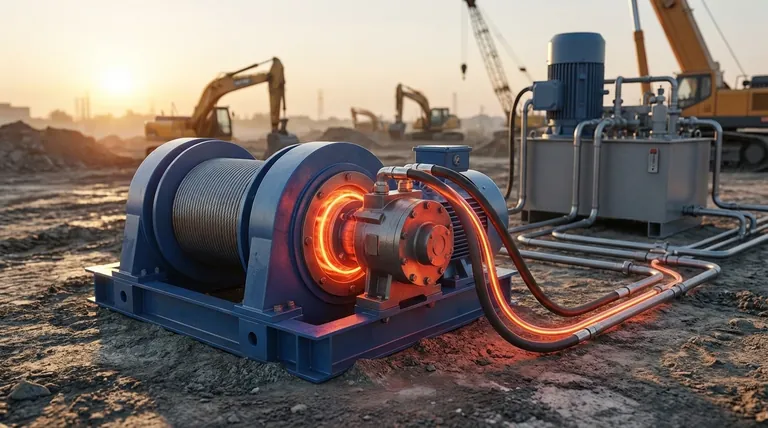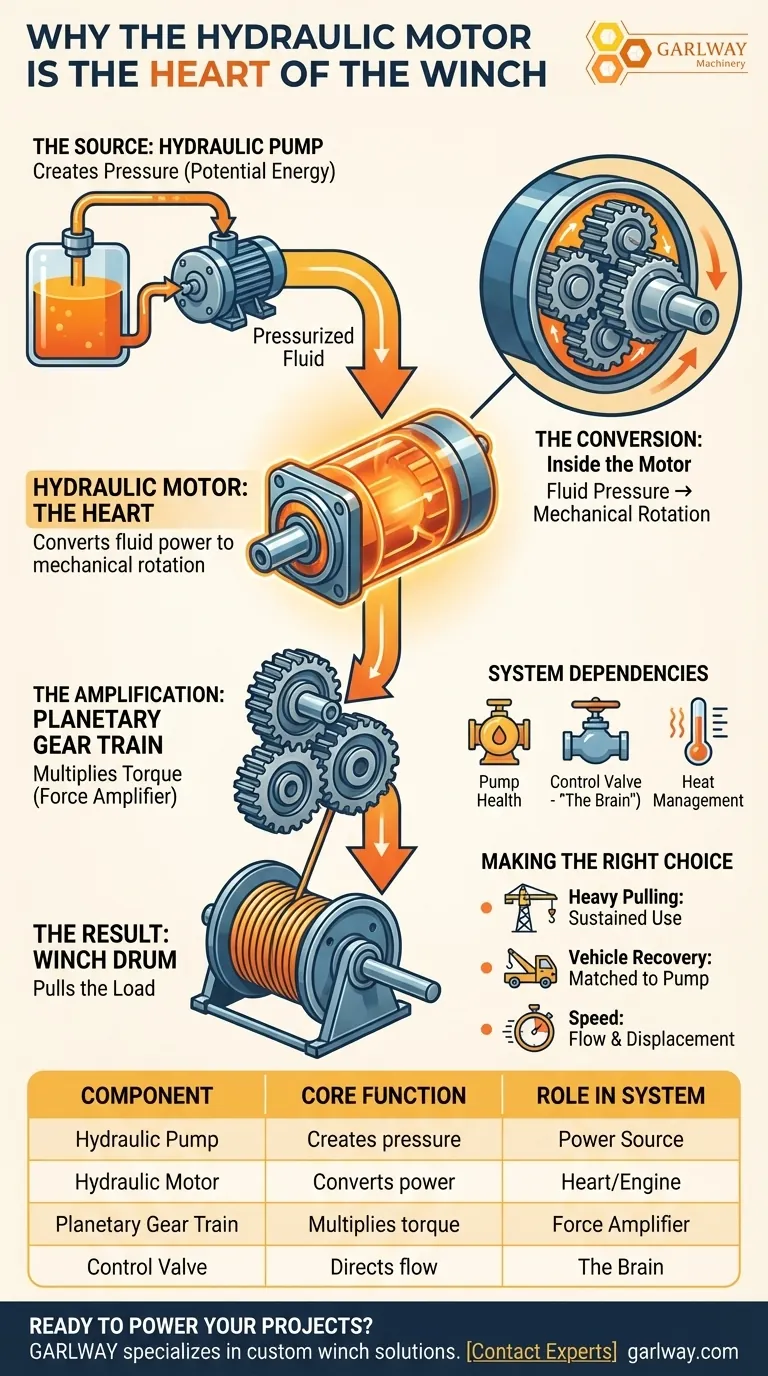The hydraulic motor is the heart of the winch because it performs the single most critical task: converting raw fluid power into useful mechanical work. It is the component that translates the hydraulic system's pressure into the rotational force that actually turns the winch drum and pulls the load.
While a pump creates the potential for work by pressurizing fluid, it is the hydraulic motor that masterfully converts that potential into the kinetic, rotational energy required for pulling. Without this conversion, the winch is just a static drum.

The Journey of Power: From Fluid to Force
To understand the motor's central role, you must visualize the flow of energy through the entire hydraulic winch system. It's a chain of events where the motor acts as the crucial link between the power source and the final output.
The Source: Pressurizing the Fluid
The process begins with a hydraulic pump. In many vehicle applications, this is the power steering pump. Its job is to take hydraulic fluid from a reservoir and place it under immense pressure.
This pressurized fluid represents stored, or potential, energy. It's ready to do work but isn't yet in a useful form for winching.
The Conversion: The Motor's Core Function
The high-pressure fluid travels through reinforced hoses to the hydraulic motor. This is where the transformation happens.
Inside the motor, the force of the incoming fluid pushes against a series of gears or pistons, forcing an output shaft to rotate. This is the precise moment hydraulic energy becomes mechanical energy. Think of it like a water wheel, where the force of flowing water is converted into the rotation of the wheel.
The Amplification: The Planetary Gear Train
The rotation from the hydraulic motor is typically very fast but lacks the raw turning force (torque) needed to pull heavy loads.
The motor's rotating shaft is connected to a planetary gear train. This gear reduction system acts as a force multiplier. It slows down the speed of the rotation significantly while multiplying its torque, creating the immense power needed to spool the winch cable under load.
The Result: The Drum and the Pull
The final, high-torque output from the gear train is what drives the winch drum. As the drum rotates, it winds the steel cable or synthetic rope, performing the pull. The entire system, from pump to drum, is orchestrated to serve this final action, with the motor being the engine that drives it.
Understanding the System's Dependencies
Calling the motor the "heart" is an accurate analogy, as its performance is entirely dependent on the health of the system supporting it. A powerful motor cannot compensate for a weak system.
The Pump-Motor Relationship
The motor can only convert the energy it receives. A pump that cannot supply sufficient fluid flow or pressure will starve the motor, leading to slow operation and a dramatic loss of pulling power. The components must be correctly sized and matched.
The Role of the Control Valve
The control valve acts as the brain, directing the flow of high-pressure fluid to the motor to make it turn forwards or in reverse. The precision and reliability of this valve directly impact your control over the winch.
Heat: The Inevitable Byproduct
The process of converting energy is not perfectly efficient; it always generates heat. The hydraulic fluid itself helps dissipate this heat, but overworking the system can lead to overheating, which thins the fluid and reduces performance.
Making the Right Choice for Your Goal
Understanding the motor's role as the central converter empowers you to look beyond simple "pulling capacity" and evaluate the entire system based on your needs.
- If your primary focus is heavy, continuous pulling: You need a system where the motor, pump, and cooling capacity are all rated for sustained industrial use.
- If your primary focus is vehicle recovery: The motor must be appropriately matched to the vehicle's power steering pump to ensure you have reliable power without damaging the vehicle's systems.
- If your primary focus is speed: The motor's displacement and the system's fluid flow (gallons per minute) will be the key specifications that determine the winch's line speed.
Ultimately, recognizing the hydraulic motor as the winch's engine of conversion is the key to appreciating how the entire system works in concert to achieve its task.
Summary Table:
| Component | Core Function | Role in the System |
|---|---|---|
| Hydraulic Pump | Creates pressure (potential energy) | The power source |
| Hydraulic Motor | Converts fluid power to rotation (kinetic energy) | The heart / engine |
| Planetary Gear Train | Multiplies torque for heavy pulling | The force amplifier |
| Control Valve | Directs fluid flow for control | The brain |
Ready to power your projects with a winch system built around a reliable heart?
At GARLWAY, we specialize in construction machinery, designing hydraulic winches with motors perfectly matched to your specific needs—whether for heavy-duty industrial pulling, efficient vehicle recovery, or high-speed operations. Our expertise ensures optimal performance and durability for construction companies and contractors worldwide.
Contact our experts today for a customized solution and discover the GARLWAY difference in power and reliability.
Visual Guide

Related Products
- Best 18000 Pound Drum Anchor Trailer Winch
- Ready Mixer Machine for Construction Ready Mix Machinery
- Electric and Hydraulic Winch for Heavy Duty Applications
- Electric Hoist Winch Boat Anchor Windlass for Marine Applications
- Heavy Duty Electric Boat Winch Windlass Anchor
People Also Ask
- How do hydraulic winches enhance efficiency in cargo handling? Achieve Controlled Power for Safer, Faster Operations
- What are the advantages of quick setting cement? Achieve Rapid Strength for Urgent Repairs
- What are the primary uses of mortar in construction? A Guide to Durable Masonry
- What are the durability benefits of hydraulic winches? Superior Performance for Heavy-Duty Tasks
- How does a manual trailer winch operate? The Simple Mechanics of Powerful Pulling
- How should hydraulic motors and pumps be maintained to avoid oil leaks? Proactive Strategies for Leak-Free Operation
- What are the primary industries where air winches are used? Essential for Oil & Gas, Mining & Marine
- How do wire rope hoists function? A Deep Dive into Lifting Mechanics and Safety








